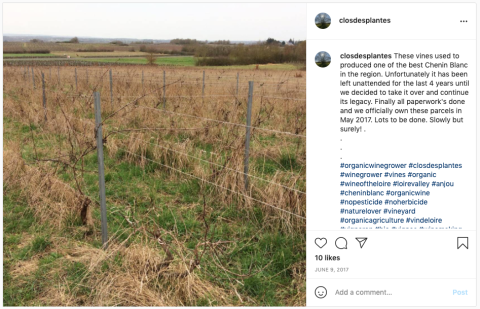From $50, SG$67.20, £39
The wine world still seems divided on natural v conventional winemaking. By way of microcosmic example, take Singapore. The bars, restaurants and retailers focusing on natural wine don't sell anything considered conventional; and vice versa everywhere else. While there are a few exceptions, it's as if the definition must be absolute, either for or against.
However, perhaps this brilliant minimal-intervention Loire Valley Chenin Blanc will bridge the gap.
I freely admit that natural wine is not my usual preference. Too often, their styles and flavours are too wild and unfamiliar for my palate. So when I went to new Singapore retailer Wine Mouth, it was in search of something outside my comfort zone that I would like.
Without guidance, I might never have bought Poïèsis, since it – like many of its natural siblings – reveals almost nothing on its label. Vin de France and a total SO2 of 16 mg/l are the only pertinent pieces of information volunteered. In fact, it doesn't even mention 'Clos des Plantes' anywhere that I could see, only the name of the winemaker, Olivier Lejeune. The label illustration, while pretty, doesn't help with the contents. Perhaps mystery is part of the appeal?
Thankfully, friendly staff were on hand to explain that this is Chenin Blanc from the Loire – always a favourite combination of mine – that wouldn't ruffle my conservative taste buds. And they were right.
I loved it because it was so typical of great Loire Chenin. A little online research reveals that the 2019 is the third vintage of this wine, which is fermented by indigenous yeast in fibreglass tanks and aged for one year in neutral vessels. The grapes come from Montbenault, within the boundaries of the Anjou appellation, but perhaps more importantly neighbouring Richard Leroy's acclaimed vineyards.
In fact, Olivier Lejeune revived an abandoned plot to create this wine, as witness this Instagram post from 2017.
Intrigued, I poured a sample and was immediately impressed by a note-perfect rendition of the beeswax and bruised-apple aromas associated with the style, followed by full body (14%) kept alert by a crackle of acid. So far, so normal – but then came flavours of orange peel, mint leaves and something animal too, perhaps the wet-wool character of the variety. It is confidently persistent, although I did wonder if there was a faint eau de hamster on the finish (I suspect I am ultra-sensitive to this). Either way, that didn't detract from the experience, although I would advocate drinking this 2019 vintage of Poïèsis young to take full advantage of its already developed complexity.
As a low-intervention wine, was it demonstrably better quality than the great Loire Chenins of Huet or Domaine de la Taille aux Loups? Perhaps not, although it was certainly their equal – as it should be at the asking price. But perhaps the question isn't one of quality, but one of philosophy. As a (former?) natural-wine sceptic, I am hugely impressed by the dedication required to make this wine – not only for regenerating a vineyard, but for the bravery required to make a wine without the modern processes that have become such a crutch in contemporary winemaking.
Poïèsis means 'bringing something into being that did not exist before', such as my new-found appreciation for natural wine. Long may it continue.
Wine-Searcher lists several retailers in California, New York and one in South Carolina; and Low Intervention in the UK (you can also find it at Vino Vero and Modal Wines). In Singapore, I bought my bottle from Wine Mouth and it's also available at Wine & Whisky.
Read more about Loire Chenin Blanc in Tamlyn's extensive exploration of the category from February this year, including over 50 tasting notes.
















